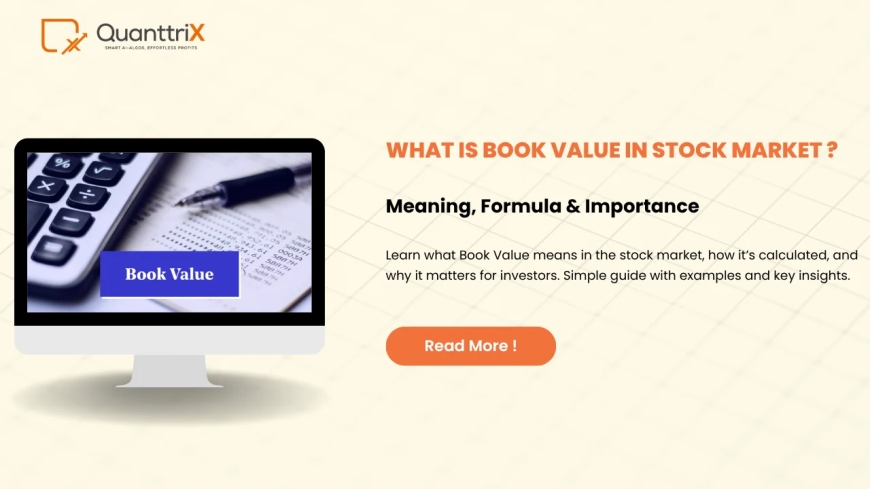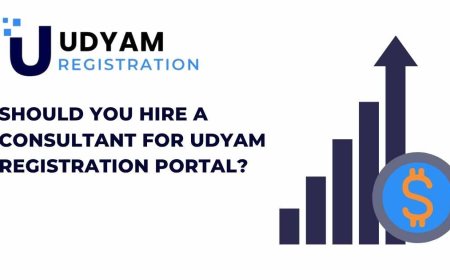What Is Book Value in Stock Market? Explained Simply
Discover what is book value in stock market. Understand book value in stock market & explore the best algo trading software in India for smart investing.

What Is Book Value in Stock Market? A Simple Guide for Everyone
Introduction
Have you ever wondered how to know if a stock is worth its price? Or why some companies seem undervalued even when they’re doing great business? This is where the concept of book value comes into play. Whether you're a casual investor or just getting curious about the stock market, understanding book value can give you a solid foundation for smarter investment decisions.
In this article, we’ll break down what is book value in stock market using simple terms, relatable examples, and practical insights. We'll also show you how this concept ties into modern tools like the best algo trading software in India that make stock investing easier and more efficient than ever.
Discover what is book value in stock market. Understand book value in stock market & explore the best algo trading software in India for smart investing.
What Does Book Value Mean?
Book value is essentially the value of a company’s assets minus its liabilities. Think of it as what the company would be worth if it were to shut down and sell everything it owns. It's like checking your piggy bank—after removing the IOUs (liabilities), what you’re left with is the actual value.
Why Is Book Value Important in the Stock Market?
Investors use book value to determine whether a stock is overvalued or undervalued. If a stock is trading below its book value, it might be a good deal—like buying a $100 item for $70.
Book value helps investors:
-
Gauge financial health
-
Evaluate investment risks
-
Identify undervalued opportunities
Book Value vs. Market Value
Book value is what a company is worth on paper, based on its balance sheet.
Market value is what people are willing to pay for it, based on the stock price.
Sometimes these values are close. Sometimes they’re miles apart. When a stock’s market price is way higher than its book value, it may be overhyped. And when it’s lower, it may be a hidden gem!
How to Calculate Book Value
Here's a simple formula:
Book Value = Total Assets – Total Liabilities
Let’s say Company A has ₹10 crore in assets and ₹3 crore in liabilities:
Book Value = ₹10 crore – ₹3 crore = ₹7 crore
This ₹7 crore is the book value that represents what the company is "really" worth if all else fails.
Components of Book Value
To understand book value better, let’s break down what goes into it:
-
Assets: Cash, equipment, real estate, inventory
-
Liabilities: Loans, bills payable, debts
-
Equity: What’s left for shareholders after paying off liabilities
When liabilities are deducted from assets, you get shareholders' equity, which is another term for book value.
Real-Life Analogy: Book Value as a House Price
Imagine you own a house worth ₹1 crore, but you have a ₹30 lakh loan on it. If you sell the house and pay off the loan, you’re left with ₹70 lakh. That’s your book value.
Similarly, a company’s book value tells you what remains after all debts are settled.
When Is Book Value More Relevant?
Book value is especially important when:
-
Analyzing value stocks
-
Assessing distressed companies
-
Comparing companies in asset-heavy industries like manufacturing, banking, and energy
In contrast, tech companies often have low or misleading book values because their value lies in intangibles like brand, IP, or data.
Limitations of Book Value
While useful, book value isn’t perfect. Some challenges include:
-
It ignores intangible assets like goodwill, reputation, and brand value
-
Assets are listed at historical cost, not current market value
-
Not helpful for service or software-based companies
That’s why it’s best to use book value alongside other tools like the P/B ratio and algo trading software.
Book Value per Share (BVPS)
Want to know how much each share is backed by in book value? Use this:
BVPS = (Shareholders’ Equity – Preferred Equity) / Total Outstanding Shares
If Company B has ₹50 crore in equity and 1 crore shares:
BVPS = ₹50 crore / 1 crore shares = ₹50 per share
This means each share is theoretically worth ₹50 based on the company’s books.
Price-to-Book (P/B) Ratio
This popular ratio helps investors compare a stock’s market price to its book value.
P/B Ratio = Market Price per Share / Book Value per Share
If a stock is trading at ₹100 and its BVPS is ₹50:
P/B Ratio = ₹100 / ₹50 = 2
A P/B ratio of 2 means the market is valuing the company at twice its book value. Is that justified? It depends.
Interpreting P/B Ratio in Real Stocks
-
P/B < 1 = Possible undervaluation
-
P/B = 1 = Fairly valued
-
P/B > 1 = Market expects future growth
However, high growth companies often have P/B ratios above 1 due to future earnings expectations.
Book Value in Different Industries
Not all industries view book value equally:
-
High Relevance: Banking, manufacturing, real estate
-
Medium Relevance: Retail, automotive
-
Low Relevance: IT, pharma, internet-based companies
In low-relevance sectors, value often lies in intellectual property, not physical assets.
Growth Stocks vs. Value Stocks
-
Value Stocks: Often have low P/B ratios and trade close to or below book value
-
Growth Stocks: Have high P/B ratios, often far exceeding book value due to future growth expectations
Knowing the difference helps you decide what kind of investor you want to be!
How Algo Trading Helps You Leverage Book Value
Book value is useful, but let’s be real—manually analyzing hundreds of stocks isn’t easy.
That’s where algorithmic trading comes in. It uses computers to:
-
Scan thousands of stocks instantly
-
Identify undervalued stocks based on book value
-
Execute trades at lightning speed
This is a game-changer for retail investors.
Best Algo Trading Software in India
Looking for the right tool? Here are top features to consider when choosing the best algo trading software in India:
-
Ease of use
-
Custom strategy builder
-
Backtesting tools
-
Book value integration
-
Real-time data feeds
Among various options, many investors have started trusting platforms like Quanttrix.io, known for combining fundamental analysis (like book value) with powerful algorithms.
If you're serious about investing and want to save time while making smarter decisions, the best algorithmic trading software India offers is definitely worth checking out.
Final Thoughts on Book Value
So, what is book value in stock market ? It’s your financial compass—pointing you toward undervalued stocks and better investment decisions.
Although it's not a magic number, it provides a reliable baseline. Combined with other metrics and modern tools like algo trading platforms, it empowers both beginners and pros to make informed choices.
In a world full of hype and speculation, book value keeps your feet on the ground.
FAQs
1. What is book value in stock market in simple words?
Book value is what a company is worth after subtracting its debts from its assets. It’s like the leftover money if the company sold everything and paid off all it owed.
2. Why is book value important for investors?
It helps investors find undervalued stocks and understand if they’re paying too much or getting a bargain.
3. Can book value change over time?
Yes, book value can go up or down as a company’s assets and liabilities change over time.
4. Is book value the same as market value?
No. Book value is based on financial records, while market value is based on stock price and investor perception.
5. How does algo trading use book value?
Algo trading software can scan for stocks trading below their book value and execute trades automatically based on that analysis.










































































